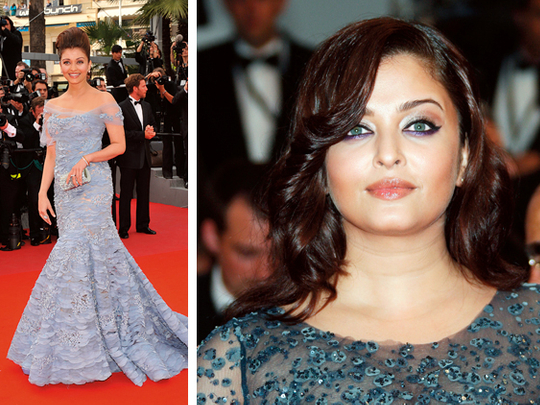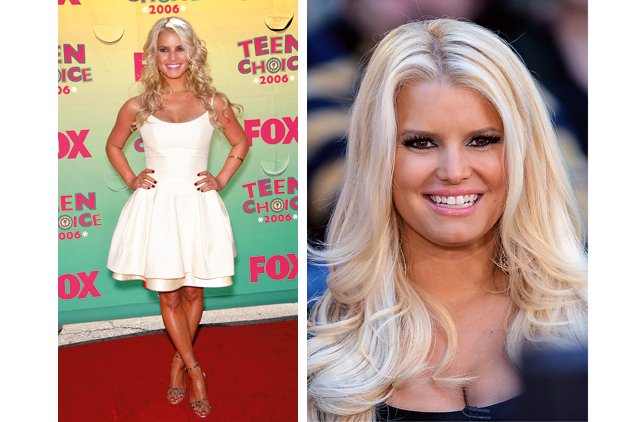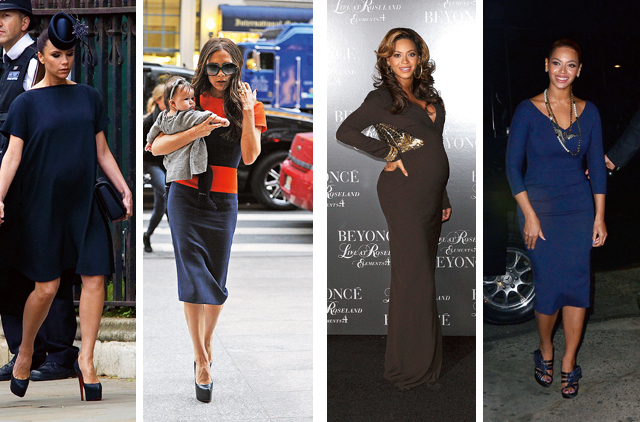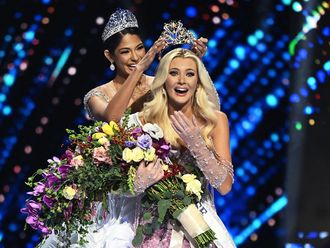
Bollywood A-lister Aishwarya Rai has become an even bigger star than she was before. No, she hasn’t made a film more popular than Jodhaa Akbar – she’s just failed to lose her pregnancy weight.
A red carpet regular and the face of several international fashion accessory houses, Aishwarya – or rather her larger-than-usual size – has been grabbing hundreds of column centimetres and hours of TV time ever since she had baby Aaradhya last November.
Crowned Miss World in 1994 and one of India’s top movie actresses, she is also married to actor Abhishek Bachchan, son of India’s most famous movie star Amitabh Bachchan.
While these are good enough reasons to remain in the spotlight in India, the media glare intensified after pictures of ‘the most beautiful woman in the world’ – as she was once considered – emerged, plump and basking in her post-pregnancy weight following her delivery. Almost a year on and Aishwarya still hasn’t lost the weight – remaining an estimated four dress sizes bigger than she was before.
Fashion and entertainment journalists, showbiz pundits, and bloggers have been abuzz, lambasting her for not losing her mummy tummy. “There’s no excuse for not getting back into shape,’’ said one blogger.
Those who hadn’t seen the pictures commented after viewing a video entitled ‘Shocking! Fat Aishwarya Rai!’ which went viral on YouTube, receiving over 319,389 views since it was uploaded in February this year. “She looks ugly’’ and “Fat doesn’t suit everybody,’’ were just some of the comments posted online, although several took up cudgels on her behalf arguing that her weight gain was just part of becoming a mother.
Two Bollywood stars Kajol and Lara Dutta, who are also young mothers, came out in the open requesting every one to “leave Ash alone’’. But Aishwarya admitted she is happy with her weight. “I am a mother. This can happen and it has happened with me and it’s fine. I’ve never been the one who endorses size zero anyway,” she told the media.
Bollywood star Shilpa Shetty followed in Aishwarya’s footsteps making it known that she, too, was in no hurry to shed the post-pregnancy pounds. Taking care of her five-month-old son Viaan took precedence. “New mothers should enjoy every phase of motherhood without caring about the world,” she was quoted as saying.
‘Separate myself from the world’s expectations’
Jessica Simpson is another celebrity who piled on the pounds during pregnancy and began shedding them only months later. Last month she revealed that she has lost more than 40 pounds since giving birth to daughter Maxwell Drew on May 1. Losing weight was a challenge, she admitted. “I put on more baby weight than I was planning. I really have to separate myself from the world’s expectations and really just look inside myself and be healthy with myself,’’ she said.
Then there’s Victoria Beckham who, just eight weeks after giving birth to her fourth child, daughter Harper Seven, stunned Hollywood watchers with her svelte figure at New York Fashion Week. The 37-year-old former Spice Girl credited her skinny figure to a strict running regime. “I ran six days a week. I worked out a lot,’’ she said.
So is it really necessary for a woman to start exercising and lose weight as soon as she exits the labour room?
While the celebrity mums who get their slender figures back within months of giving birth must feel rather pleased with themselves, their example holds no weight with the experts. Research conducted in the UK shows that 40 per cent of midwives think the celebrity yummy mummy culture is having the biggest negative influence on a woman’s post-birth body, and both obstetricians and fitness experts say rapid weight loss after having a baby is absolutely not the way to go.
But it’s hard for new mums to avoid media images of stars such as Beyoncé. The singer, who gave birth to her daughter Blue Ivy in January, says she lost 27kg in less than five months by “eating lettuce” and running three or four times a week. However, while a recent survey by the skin treatment experts at Bio-Oil revealed that 42 per cent of women feel less confident with their bodies after having a baby, and one in six feel pressure to get their bodies back into pre-pregnancy shape, it also found that 88 per cent of women believe pictures of slim and glamorous celebrities put pressure on women to look perfect.
The survey of 177 midwives in the UK found that more than one-third of them believed women have low body confidence because they’re unprepared for the changes that occur to their body during and after pregnancy.
Midwife Hannah Challen says, “Women need to be kinder to their bodies after birth and be realistic about giving themselves time to recover. Exercise and a balanced diet will help bodies get back into shape, but try to give yourself a realistic time frame to do this in.” Of course, it’s easier to lose weight after having a baby if you weren’t overweight before.
After all, being a normal weight makes it easier to get pregnant, and reduces the risk of complications during pregnancy, points out consultant obstetrician Patrick O’Brien who is based in London. He stresses that women who are overweight when pregnant shouldn’t try to lose weight, but should focus on eating healthily, getting regular exercise and keeping weight under control without restricting calories.
“After the birth there’s huge pressure on women to lose the weight quickly and be like Posh Spice and back to normal within six weeks,” he says. “But that’s crazy. It’s almost impossible for any normal person to do that. You gain the weight over time when you’re pregnant, so be prepared to lose it gradually over six months or so after you’ve had the baby, and do it in a healthy way.”
The breastfeeding weight-loss myth
Patrick says that while breastfeeding does burn a lot of calories, the possibility that it helps new mothers lose weight may be a myth, as mothers who breastfeed have a larger appetite and they eat more as a result. The best way to tackle baby weight is to eat healthily and exercise. However, while new mums might manage to eat healthily, they may baulk at the thought of regular exercise, as lack of sleep and the rigours of looking after a new baby can make finding the time and enthusiasm for exercise tough.
But Marie Behenna, an expert in both post- and ante-natal fitness and creator of the FitMama Method and author of The FitMama Method: The complete guide to confidence and fitness for birth (available on Amazon.com), explains that new mums don’t need to get on the treadmill and do strenuous workouts. She says 20 minutes of brisk walking most days, plus pelvic floor exercises, is what women should aim for after a pregnancy.
“Take your baby in a buggy, go up a steep hill and work hard with your heart. Women don’t need to put themselves under pressure to go to the gym for an hour and a half every day.” A Pilates class or a post-natal specific exercise class is a useful addition, she says. She suggests getting together with a few other mums to go for brisk walks with buggies, and points out that the endorphins produced by exercise will help issues such as post-natal depression.
Any post-natal exercises need to help repair the pelvic floor and the body core, she says, and high-impact exercises aren’t appropriate after you have delivered. It can take at least two years for women to get back to normality if they’re not exercising, Marie says. “Women should be making sure they’re fixed from the inside out, so focus on pelvic floors, nutrition, tidying up the muscles, and doing exercises that are safe and effective.”
Good nutrition is vital, but people get the wrong idea. “They think it means starving yourself and squeezing back into skinny jeans. It’s about getting the right balance of nutrition to enable you to deal with the disastrous sensations that motherhood throws at you,” Marie says.
Three healthy, balanced meals with plenty of fruit and vegetables and healthy snacks in between will help keep energy levels up. “The first six weeks of motherhood are like a train smash, and women’s bodies are going to need so much support from food to help cope with lack of sleep, and constant feeding demands,” she adds.
Marie warns that there are no long-term benefits of being too thin, as it puts strain on organs. “We have this distorted view that women should be extremely slim to be attractive, and it’s just not true. “You can see the pull of wanting to be really slim after having a baby, but a post-natal woman who’s curvaceous – not overweight, but looking healthy – is a far more appealing picture than a post-natal woman who’s really struggling to cope because she’s starved herself.”













